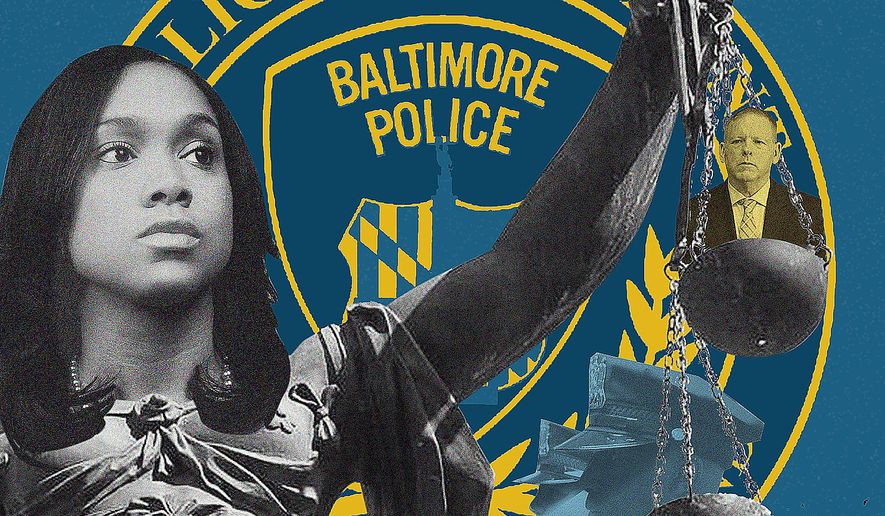OPINION:
Baltimore’s chief prosecutor, Marilyn Mosby, continues to make news with her pronouncement that 305 Baltimore police officers are unfit to testify in court due to “integrity issues.” Since she herself has been credibly accused of perjury, the hypocrisy of the whole matter is not lost on most observers.
Mrs. Mosby initially propelled herself to national stardom as a prosecutor who pursues social justice over public safety when she famously announced charges, including murder charges, against police officers involved in the arrest of Freddie Gray. None of those officers was convicted of any crime.
Since then, the rate of homicides, shootings and other violent crime has climbed precipitously and shown no signs of retreating. Much of the city’s leadership capacity has been in constant turmoil, too. Baltimore is on its third mayor and fifth police commissioner in just a little over four years. If there has been any leadership consistency at all, it would be in Mrs. Mosby’s laser focus on preventing Baltimore police officers from engaging in effective law enforcement.
In a line of U.S. Supreme Court cases beginning with Brady v. Maryland in 1963, it is well-established constitutional law that prosecutors have an affirmative duty to notify criminal defendants if any witness called by the prosecution has a history of conduct bearing upon their integrity or truthfulness. Once the defendant is aware, they can obtain additional information about the witness’ history of untruthfulness or bias and may be permitted to cross examine the witness regarding that history. This is an important and fundamental constitutional right.
In the context of professional witnesses, such as law enforcement officers, it is especially important defendants be made aware of prior instances in which the officer was found to have been dishonest. Many people accept the word of a police officer as carrying greater weight than a typical citizen. If the officer had previously been found unworthy of that trust, defendants and their attorneys must have ample opportunity to explore that at trial.
When Mrs. Mosby casually, and without providing any details, mentions 305 officers whom the State’s Attorney’s Office will not call to testify, the scope of the apparent crisis shocks the conscience of the community, which is already raw from previous scandals that undermine public confidence. But the claims she makes about the extent of this integrity “crisis” appear overblown and calculated to solidify her political base, largely at the expense of public safety.
The Baltimore Police Department’s official response, through the current deputy commissioner of the Public Integrity Bureau, is helpful to understand what is really happening here. Deputy Commissioner Brian Nadeau was recently appointed to that position after a career with the FBI. In his testimony before the Commission to Restore Trust in Policing, he said that only 22 officers of the 305 on the list have a disciplinary finding that raises questions about their integrity. Of that number, just two are current Baltimore Police Department officers.
Why would Mrs. Mosby refuse to call the remaining 283 officers to testify, especially as the city faces intolerably high levels of crime and modern-era lows in staffing of the police department?
It seems by all available information that the vast majority of the 305 officers on Mrs. Mosby’s list have no integrity issues at all. Another subset likely are or have been the subject of an unproven allegation that relates to integrity or truthfulness.
As the elected chief prosecutor of Baltimore, Marilyn Mosby owes it to the public she serves to focus more on public safety and less on picking public fights with police just to score political points with her base.
• Jason Johnson is a former deputy commissioner with the Baltimore Police Department and is currently president of the Law Enforcement Legal Defense Fund. He can be contacted at jason@leldf.org.




Please read our comment policy before commenting.